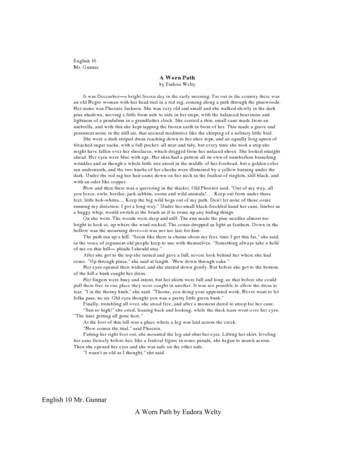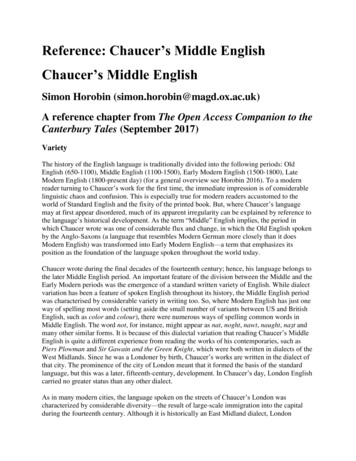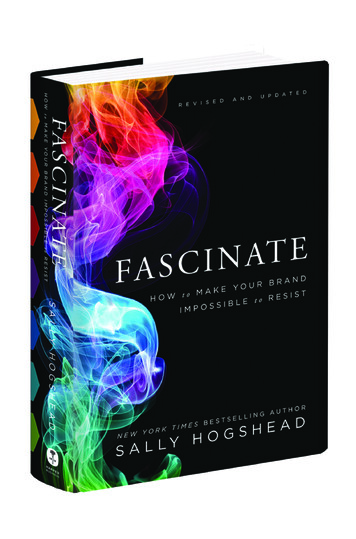
Transcription
English 10 Mr. GunnarA Worn Path by Eudora Welty
It was December—a bright frozen day in the early morning. Far out in the country there wasan old Negro woman with her head tied in a red rag, coming along a path through the pinewoods.Her name was Phoenix Jackson. She was very old and small and she walked slowly in the darkpine shadows, moving a little from side to side in her steps, with the balanced heaviness andlightness of a pendulum in a grandfather clock. She carried a thin, small cane made from anumbrella, and with this she kept tapping the frozen earth in front of her. This made a grave andpersistent noise in the still air, that seemed meditative like the chirping of a solitary little bird.She wore a dark striped dress reaching down to her shoe tops, and an equally long apronof bleached sugar sacks, with a full pocket: all neat and tidy, but every time she took a step shemight have fallen over her shoelaces, which dragged from her unlaced shoes. She looked straightahead. Her eyes were blue with age. Her skin had a pattern all its own of numberless branchingwrinkles and as though a whole little tree stood in the middle of her forehead, but a golden colorran underneath, and the two knobs of her cheeks were illumined by a yellow burning under thedark. Under the red rag her hair came down on her neck in the frailest of ringlets, still black, andwith an odor like copper.Now and then there was a quivering in the thicket. Old Phoenix said, "Out of my way, allyou foxes, owls, beetles, jack rabbits, coons and wild animals!. . . Keep out from under thesefeet, little bob-whites. Keep the big wild hogs out of my path. Don't let none of those comerunning my direction. I got a long way." Under her small black-freckled hand her cane, limber asa buggy whip, would switch at the brush as if to rouse up any hiding things.On she went. The woods were deep and still. The sun made the pine needles almost toobright to look at, up where the wind rocked. The cones dropped as light as feathers. Down in thehollow was the mourning dove—it was not too late for him.The path ran up a hill. "Seem like there is chains about my feet, time I get this far," she said,in the voice of argument old people keep to use with themselves. "Something always take a holdof me on this hill— pleads I should stay."After she got to the top she turned and gave a full, severe look behind her where she hadcome. "Up through pines," she said at length. "Now down through oaks."Her eyes opened their widest, and she started down gently. But before she got to the bottomof the hill a bush caught her dress.Her fingers were busy and intent, but her skirts were full and long, so that before she couldpull them free in one place they were caught in another. It was not possible to allow the dress totear. "I in the thorny bush," she said. "Thorns, you doing your appointed work. Never want to letfolks pass, no sir. Old eyes thought you was a pretty little green bush."Finally, trembling all over, she stood free, and after a moment dared to stoop for her cane. "Sunso high!" she cried, leaning back and looking, while the thick tears went over her eyes. "The timegetting all gone here."
At the foot of this hill was a place where a log was laid across the creek. "Now comes the trial,"said Phoenix. Putting her right foot out, she mounted the log and shut her eyes. Lifting her skirt,leveling her cane fiercely before her, like a festival figure in some parade, she began to marchacross. Then she opened her eyes and she was safe on the other side."I wasn't as old as I thought," she said.
But she sat down to rest. She spread her skirts on the bank around her and folded her handsover her knees. Up above her was a tree in a pearly cloud of mistletoe. She did not dare to closeher eyes, and when a little boy brought her a plate with a slice of marble-cake on it she spoke tohim. "That would be acceptable," she said. But when she went to take it there was just her ownhand in the air.So she left that tree, and had to go through a barbed-wire fence. There she had to creep andcrawl, spreading her knees and stretching her fingers like a baby trying to climb the steps. Butshe talked loudly to herself: she could not let her dress be torn now, so late in the day, and shecould not pay for having her arm or her leg sawed off if she got caught fast where she was.At last she was safe through the fence and risen up out in the clearing. Big dead trees, likeblack men with one arm, were standing in the purple stalks of the withered cotton field. There sata buzzard."Who you watching?" In the furrow she made her way along. "Glad this not the season forbulls," she said, looking sideways, "and the good Lord made his snakes to curl up and sleep inthe winter. A pleasure I don't see no two-headed snake coming around that tree, where it comeonce. It took a while to get by him, back in the summer."She passed through the old cotton and went into a field of dead corn. It whispered and shookand was taller than her head. "Through the maze now," she said, for there was no path.Then there was something tall, black, and skinny there, moving before her. At first she took it fora man. It could have been a man dancing in the field. But she stood still and listened, and it didnot make a sound. It was as silent as a ghost."Ghost," she said sharply, "who be you the ghost of? For I have heard of nary death closeby."But there was no answer--only the ragged dancing in the wind. She shut her eyes, reached outher hand, and touched a sleeve. She found a coat and inside that an emptiness, cold as ice."You scarecrow," she said. Her face lighted. "I ought to be shut up for good," she said withlaughter. "My senses is gone. I too old. I the oldest people I ever know. Dance, old scarecrow,"she said, "while I dancing with you."She kicked her foot over the furrow, and with mouth drawn down, shook her head once ortwice in a little strutting way. Some husks blew down and whirled in streamers about her skirts.Then she went on, parting her way from side to side with the cane, through the whisperingfield. At last she came to the end, to a wagon track where the silver grass blew between the redruts. The quail were walking around like pullets, seeming all dainty and unseen."Walk pretty," she said. "This the easy place. This the easy going." She followed the track,swaying through the quiet bare fields, through the little strings of trees silver in their dead leaves,past cabins silver from weather, with the doors and windows boarded shut, all like old womenunder a spell sitting there. "I walking in their sleep," she said, nodding her head vigorously.
In a ravine she went where a spring was silently flowing through a hollow log. Old Phoenixbent and drank. "Sweet-gum makes the water sweet," she said, and drank more. "Nobody knowwho made this well, for it was here when I was born."The track crossed a swampy part where the moss hung as white as lace from everylimb. "Sleep on, alligators, and blow your bubbles." Then the track went into the road.2
Deep, deep the road went down between the high green-colored banks. Overhead the liveoaks met, and it was as dark as a cave.A black dog with a lolling tongue came up out of the weeds by the ditch. She wasmeditating, and not ready, and when he came at her she only hit him a little with her cane. Overshe went in the ditch, like a little puff of milkweed.Down there, her senses drifted away. A dream visited her, and she reached her hand up, butnothing reached down and gave her a pull. So she lay there and presently went to talking. "Oldwoman," she said to herself, "that black dog come up out of the weeds to stall you off, and nowthere he sitting on his fine tail, smiling at you."A white man finally came along and found her—a hunter, a young man, with his dog on achain."Well, Granny!" he laughed. "What are you doing there?" "Lying on my back like a June-bugwaiting to be fumed over, mister," she said, reaching up her hand.He lifted her up, gave her a swing in the air, and set her down. "Anything broken, Granny?" "Nosir, them old dead weeds is springy enough," said Phoenix, when she had got her breath. "I thankyou for your trouble.""Where do you live, Granny?" he asked, while the two dogs were growling at each other. "Awayback yonder, sir, behind the ridge. You can't even see it from here." "On your way home?" "Nosir, I going to town." "Why, that's too far! That's as far as I walk when I come out myself, andI get something for my trouble." He patted the stuffed bag he carried, and there hung down alittle closed claw. It was one of the bob-whites, with its beak hooked bitterly to show it wasdead. "Now you go on home, Granny!""I bound to go to town, mister," said Phoenix. "The time come around." He gave another laugh,filling the whole landscape. "I know you old colored people! Wouldn't miss going to town to seeSanta Claus!"But something held old Phoenix very still. The deep lines in her face went into a fierce anddifferent radiation. Without warning, she had seen with her own eyes a flashing nickel fall out ofthe man's pocket onto the ground."How old are you, Granny?" he was saying. "There is no telling, mister," she said, "no telling."Then she gave a little cry and clapped her hands and said, "Git on away from here, dog! Look!Look at that dog!" She laughed as if in admiration. "He ain't scared of nobody. He a big blackdog." She whispered, "Sic him!""Watch me get rid of that cur," said the man. "Sic him, Pete! Sic him!" Phoenix heard the dogsfighting, and heard the man running and throwing sticks. She even heard a gunshot. But she wasslowly bending forward by that time, further and further forward, the lids stretched down overher eyes, as if she were doing this in her sleep. Her chin was lowered almost to her knees. Theyellow palm of her hand came out from the fold of her apron. Her fingers slid down and along
the ground under the piece of money with the grace and care they would have in lifting an eggfrom under a setting hen. Then she slowly straightened up, she stood erect, and the nickel was inher apron pocket. A bird flew by. Her lips moved. "God watching me the whole time. I come tostealing."3
The man came back, and his own dog panted about them. "Well, I scared him off that time,"he said, and then he laughed and lifted his gun and pointed it at Phoenix.She stood straight and faced him. "Doesn't the gun scare you?" he said, still pointing it. "No, sir,I seen plenty go off closer by, in my day, and for less than what I done," she said, holding utterlystill.He smiled, and shouldered the gun. "Well, Granny," he said, "you must be a hundred yearsold, and scared of nothing. I'd give you a dime if I had any money with me. But you take myadvice and stay home, and nothing will happen to you.""I bound to go on my way, mister," said Phoenix. She inclined her head in the red rag. Thenthey went in different directions, but she could hear the gun shooting again and again over thehill.She walked on. The shadows hung from the oak trees to the road like curtains. Then shesmelled wood-smoke, and smelled the river, and she saw a steeple and the cabins on their steepsteps. Dozens of little black children whirled around her. There ahead was Natchez shining. Bellswere ringing. She walked on.In the paved city it was Christmas time. There were red and green electric lights strung andcrisscrossed everywhere, and all turned on in the daytime. Old Phoenix would have been lost ifshe had not distrusted her eyesight and depended on her feet to know where to take her.She paused quietly on the sidewalk where people were passing by. A lady came along in thecrowd, carrying an armful of red-, green- and silver-wrapped presents; she gave off perfume likethe red roses in hot summer, and Phoenix stopped her."Please, missy, will you lace up my shoe?" She held up her foot. "What do you want,Grandma?" "See my shoe," said Phoenix. "Do all right for out in the country, but wouldn't lookright to go in a big building.""Stand still then, Grandma," said the lady. She put her packages down on the sidewalkbeside her and laced and tied both shoes tightly."Can't lace 'em with a cane," said Phoenix. "Thank you, missy. I doesn't mind asking a nicelady to tie up my shoe, when I gets out on the street."Moving slowly and from side to side, she went into the big building, and into a tower ofsteps, where she walked up and around and around until her feet knew to stop.She entered a door, and there she saw nailed up on the wall the document that had beenstamped with the gold seal and framed in the gold frame, which matched the dream that washung up in her head."Here I be," she said. There was a fixed and ceremonial stiffness over her body. "A charity case,I suppose," said an attendant who sat at the desk before her. But Phoenix only looked above herhead. There was sweat on her face, the wrinkles in her skin shone like a bright net.
"Speak up, Grandma," the woman said. "What's your name? We must have your history, youknow. Have you been here before? What seems to be the trouble with you?"Old Phoenix only gave a twitch to her face as if a fly were bothering her. "Are you deaf?" criedthe attendant. But then the nurse came in. "Oh, that's just old Aunt Phoenix," she said. "Shedoesn't come for herself—she has a little grandson. She makes these trips just as regular asclockwork. She lives away back off the Old4
Natchez Trace." She bent down. "Well, Aunt Phoenix, why don't you just take a seat? We won'tkeep you standing after your long trip." She pointed.The old woman sat down, bolt upright in the chair. "Now, how is the boy?" asked the nurse. OldPhoenix did not speak. "I said, how is the boy?" But Phoenix only waited and stared straightahead, her face very solemn and withdrawn into rigidity."Is his throat any better?" asked the nurse. "Aunt Phoenix, don't you hear me? Is yourgrandson's throat any better since the last time you came for the medicine?"With her hands on her knees, the old woman waited, silent, erect and motionless, just as ifshe were in armor."You mustn't take up our time this way, Aunt Phoenix," the nurse said. "Tell us quicklyabout your grandson, and get it over. He isn't dead, is he?'At last there came a flicker and then a flame of comprehension across her face, and shespoke."My grandson. It was my memory had left me. There I sat and forgot why I made my longtrip.""Forgot?" The nurse frowned. "After you came so far?" Then Phoenix was like an old womanbegging a dignified forgiveness for waking up frightened in the night. "I never did go to school,I was too old at the Surrender," she said in a soft voice. "I'm an old woman without an education.It was my memory fail me. My little grandson, he is just the same, and I forgot it in the coming.""Throat never heals, does it?" said the nurse, speaking in a loud, sure voice to old Phoenix.By now she had a card with something written on it, a little list. "Yes. Swallowed lye. When wasit?—January—two, three years ago?"Phoenix spoke unasked now. "No, missy, he not dead, he just the same. Every little whilehis throat begin to close up again, and he not able to swallow. He not get his breath. He not ableto help himself. So the time come around, and I go on another trip for the soothing medicine.""All right. The doctor said as long as you came to get it, you could have it," said thenurse. "But it's an obstinate case.""My little grandson, he sit up there in the house all wrapped up, waiting by himself,"Phoenix went on. "We is the only two left in the world. He suffer and it don't seem to put himback at all. He got a sweet look. He going to last. He wear a little patch quilt and peep outholding his mouth open like a little bird. I remembers so plain now. I not going to forget himagain, no, the whole enduring time. I could tell him from all the others in creation.""All right." The nurse was trying to hush her now. She brought her a bottle ofmedicine. "Charity," she said, making a check mark in a book.Old Phoenix held the bottle close to her eyes, and then carefully put it into her pocket. "I thankyou," she said. "It's Christmas time, Grandma," said the attendant. "Could I give you a few
pennies out of my purse?""Five pennies is a nickel," said Phoenix stiffly. "Here's a nickel," said the attendant.5
Phoenix rose carefully and held out her hand. She received the nickel and then fished theother nickel out of her pocket and laid it beside the new one. She stared at her palm closely, withher head on one side.Then she gave a tap with her cane on the floor. "This is what come to me to do," she said. "Igoing to the store and buy my child a little windmill they sells, made out of paper. He going tofind it hard to believe there such a thing in the world. I'll march myself back where he waiting,holding it straight up in this hand."She lifted her free hand, gave a little nod, turned around, and walked out of the doctor'soffice. Then her slow step began on the stairs, going down.6
Everything That Rises Must ConvergeFlannery O’Connor5101520253035Her doctor had told Julian's mother that she must lose twenty pounds on account of her bloodpressure, so on Wednesday nights Julian had to take her downtown on the bus for a reducingclass at the Y. The reducing class was de-signed for working girls over fifty, who weighed from165 to 200 pounds. His mother was one of the slimmer ones, but she said ladies did not tell theirage or weight. She would not ride the buses by herself at night since they had been integrated,and because the reducing class was one of her few pleasures, necessary for her health, and free,she said Julian could at least put himself out to take her, considering all she did for him. Juliandid not like to consider all she did for him, but every Wednesday night he braced himself andtook her.She was almost ready to go, standing before the hall mirror, putting on her hat, while he, hishands behind him, ap-peared pinned to the door frame, waiting like Saint Sebastian for thearrows to begin piercing him. The hat was new and had cost her seven dollars and a half. Shekept saying, “Maybe I shouldn't have paid that for it. No, I shouldn't have. I'll take it off andreturn it tomorrow. I shouldn't have bought it.”Julian raised his eyes to heaven. “Yes, you should have bought it,” he said. “Put it on and let'sgo.” It was a hideous hat A purple velvet flap came down on one side of it and mood up on theother; the rest of it was green and looked like a cushion with the stuffing out. He decided it wasless comical than jaunty and pathetic. Everything that gave her pleasure was small and depressedhim.She lifted the hat one more time and set it down slowly on top of her head. Two wings of grayhair protruded on either side of her florid face, but her eyes, sky-blue, were as innocent anduntouched by experience as they must have been when she was ten. Were it not that she was awidow who had struggled fiercely to feed and clothe and put him through school and who wassupporting him still, “until he got on his feet,” she might have been a little girl that he had to taketo town. “It's all right, it's all right,” he said. “Let's go.” He opened door himself and starteddown the walk to get her going. The sky was a dying violet and the houses stood out darklyagainst it, bulbous liver-colored monstrosities of a uniform ugliness though no two were alike.Since this had been a fashionable neighborhood forty years ago, his mother persisted in thinkingthey did well to have an apartment in it. Each house had a narrow collar of dirt around it inwhich sat, usually, a grubby child. Julian walked with his hands in his pockets, his head downand thrust forward and his eyes glazed with the determination to make himself completely numbduring the time he would be sacrificed to her pleasure.The door closed and he turned to find the dumpy figure, surmounted by the atrocious hat,coming toward him. “Well,” she said, “you only live once and paying a little more for it, I atleast won't meet myself coming and going.”“Some day I'll start making money,” Julian said gloomily- he knew he never would - “and youcan have one of those jokes whenever you take the fit.” But first they would move. He
4045505560657075visualized a place where the nearest neighbors would be three miles away on either side.“I think you're doing fine,” she said, drawing on her gloves. “You've only been out of school ayear. Rome wasn't built in a day.”She was one of the few members of the Y reducing class who arrived in hat and gloves andwho had a son who had been to college. “It takes time,” she said, “and the world is in such amess. This hat looked better on me than any of the others, though when she brought it out I said,‘Take that thing back. I wouldn't have it on my head,’ and she said, ‘Now wait till you see it on,’and when she put it on me, I said, ‘We-ull,’ and she said, ‘If you ask me, that hat does somethingfor you and you do something for the hat, and besides,’ she said, ‘with that hat, you won't meetyourself coming and going.’”Julian thought he could have stood his lot better if she had been selfish, if she had been an oldhag who drank and screamed at him. He walked along, saturated in depression, as if in the midstof his martyrdom he had lost his faith. Catching sight of his long, hopeless, irritated face, shestopped suddenly with a grief-stricken look, and pulled back on his arm. “Wait on me,” she said.“I'm going back to the house and take this thing off and tomorrow I'm going to return it. I wasout of my head. I can pay the gas bill with that seven-fifty.”He caught her arm in a vicious grip. “You are not going to take it back,” he said. “I like it.”“Well,” she said, “I don't think I ought. . .”“Shut up and enjoy it,” he muttered, moredepressed than ever.“With the world in the mess it's in,” she said, “it's a wonder we can enjoy anything. I tell you,the bottom rail is on the top.”Julian sighed.“Of course,” she said, “if you know who you are, you can go anywhere.” She said this everytime he took her to the reducing class. “Most of them in it are not our kind of people,” she said,“but I can be gracious to anybody. I know who I am.”“They don't give a damn for your graciousness,” Julian said savagely. “Knowing who you areis good for one generation only. You haven't the foggiest idea where you stand now or who youare.”She stopped and allowed her eyes to flash at him. “I most certainly do know who I am,” shesaid, “and if you don't know who you are, I'm ashamed of you.”“Oh hell,” Julian said.“Your great-grandfather was a former governor of this state,” she said. “Your grandfather wasa prosperous land-owner. Your grandmother was a Godhigh.”“Will you look around you,” he said tensely, “and see where you are now?” and he swept hisarm jerkily out to indicate the neighborhood, which the growing darkness at least made lessdingy.“You remain what you are,” she said. “Your great-grand-father had a plantation and twohundred slaves.”“There are no more slaves,” he said irritably.“They were better off when they were,” she said. He groaned to see that she was off on that
80859095100105110115topic. She rolled onto it every few days like a train on an open track. He knew every stop, everyjunction, every swamp along the way, and knew the exact point at which her conclusion wouldroil majestically into the station: “It's ridiculous. It's simply not realistic. They should rise, yes,but on their own side of the fence.”“Let's skip it,” Julian said.“The ones I feel sorry for,” she said, “are the ones that are half white. They're tragic.”“Will you skip it?”“Suppose we were half white. We would certainly have mixed feelings.”“I have mixed feelings now,” he groaned.“Well let's talk about something pleasant,” she said. “I remember going to Grandpa's when Iwas a little girl. Then the house had double stairways that went up to what was really the secondfloor - all the cooking was done on the first. I used to like to stay down in the kitchen on accountof the way the walls smelled. I would sit with my nose pressed against the plaster and take deepbreaths. Actually the place belonged to the Godhighs but your grandfather Chestny paid themortgage and saved it for them. They were in reduced circumstances,” she said, “but reduced ornot, they never forgot who they were.”“Doubtless that decayed mansion reminded them,” Julian muttered. He never spoke of itwithout contempt or thought of it without longing. He had seen it once when he was a childbefore it had been sold. The double stairways had rotted and been torn down. Negroes wereliving in it. But it remained in his mind as his mother had known it. It appeared in his dreamsregularly. He would stand on the wide porch, listening to the rustle of oak leaves, then wanderthrough the high-ceilinged hall into the parlor that opened onto it and gaze at the worn rugs andfaded draperies. It occurred to him that it was he, not she, who could have appreciated it. Hepreferred its threadbare elegance to anything he could name and it was because of it that all theneighborhoods they had lived in had been a torment to him - whereas she had hardly known thedifference. She called her insensitivity “being adjustable.”“And I remember the old darky who was my nurse, Caroline. There was no better person inthe world. I've always had a great respect for my colored friends,” she said. “I’d do anything inthe world for them and they'd. . .”“Will you for God's sake get off that subject?” Julian said. When he got on a bus by himself,he made it a point to sit down beside a Negro, in reparation as it were for his mother's sins.“You're mighty touchy tonight,” she said. “Do you feel all right?”“Yes I feel all right” he said. “Now lay off.”She pursed her lips. “Well, you certainly are in a vile humor,” she observed “I just won't speakto you at all.”They had reached the bus stop. There was no bus in sight and Julian, his hands still jammed inhis pockets and his head thrust forward, scowled down the empty street. The frustration ofhaving to wait on the bus as well as ride on it began to creep up his neck like a hot hand. Thepresence of his mother was borne in upon him as she gave a pained sigh. He looked at herbleakly. She was holding herself very erect under the preposterous hat wearing it like a banner of
120125130135140145150155her imaginary dignity. There was in him an evil urge to break her spirit. He suddenly unloosenedhis tie and pulled it off and put it in his pocketShe stiffened. “Why must you look like that when you take me to town?” she said. “Why mustyou deliberately embarrass me?”“If you'll never learn where you arc,” he said, “you can at least learn where I am.”“You look like a thug,” she said.“Then I must be one” he murmured.“I'll just go home” she said. “I will not bother you. If you can’t do a little thing’ like that forme . . .”Rolling his eyes upward, he put his tie back on. “Restored to my class,” he muttered. He thrusthis face toward her and hissed, “True culture is in the mind, the mind,” he said, and tapped hishead, “the mind.”“It's in the heart,” she said, “and in how you do things and how you do things is because ofwho you are.”“Nobody in the damn bus cares who you are.”“I care who I am” she said icily.The lighted bus appeared on top of the next hill and as it approached, they moved out into thestreet to meet it. He put his hand under her elbow and hoisted her up On the creaking step. Sheentered with a little smile, as if she were going into a drawing room where everyone had beenwaiting for her. While he put in the tokens, she sat down on one of the broad front seats for threewhich faced the aisle. A thin woman with protruding teeth and long yellow hair was sitting onthe end of it. His mother moved up beside her and left room for Julian beside herself. He satdown and looked at the floor across the aisle where a pair of thin feet in red and white canvassandals were planted.His mother immediately began a general conversation meant to attract anyone who felt liketalking. “Can it get any hotter?” she said and removed from her purse a folding fan, black with aJapanese scene on it, which she began to flutter before her.“I reckon it might could,” the woman with the protruding teeth said, “but I know for a fact myapartment couldn’t get no hotter.”“It must get the afternoon sun, " his mother said. She sat forward and looked up and down thebus. It was half filled. Everybody was white. “I see we have the bus to ourselves,” she said.Julian cringed.“For a change,” said the woman across the aisle, the owner of the red and white canvassandals. “I come on one the other day and they were thick as fleas - up front and all through.”“The world is in a mess everywhere,” his mother said. “I don't know how we’ve let it get inthis fix.”“What gets my goat is all those boys from good families stealing automobile tires,” the womanwith the protruding teeth said. “I told my boy, I said you may not be rich but you been raisedright and if I ever catch you in any such mess, they can send you on to the reformatory. Beexactly where you belong.”
160165170175180185190195“Training tells,” his mother said. “Is your boy in high school?”“Ninth grade,” the woman said.“My son just finished college last year. He wants to write but he’s selling typewriters until hegets started,” his mother said.The woman leaned forward and peered at Julian. He threw her such a malevolent look that shesubsided against the seat. On the floor across the aisle there was an abandoned newspaper. Hegot up and got it and opened it out in front of him. His mother discreetly continued theconversation in a lower tone but the woman across the aisle said in a loud voice, “Well that’snice. Selling typewriters is close to writing. He can go right from one to the other.”“I tell him,” his mother said, “that Rome wasn't built in a day.”Behind the newspaper Julian was withdrawing into the inner compartment of his mind
Her eyes opened their widest, and she started down gently. But before she got to the bottom of the hill a bush caught her dress. Her fingers were busy and intent, but her skirts were full and long, so that before she could pull them free in one place they were caught in










